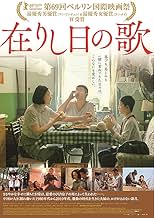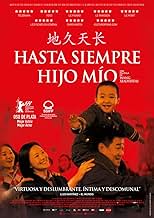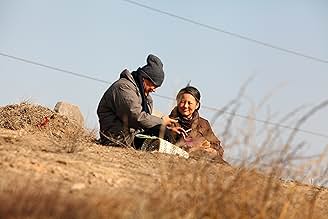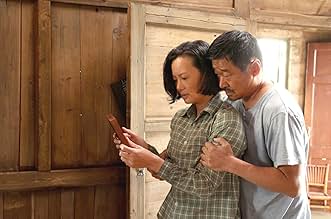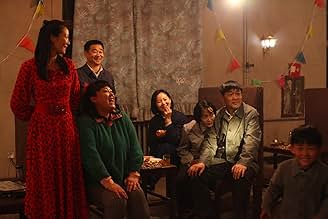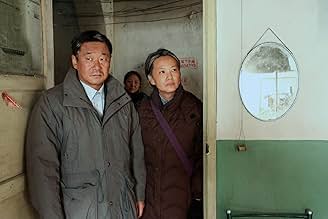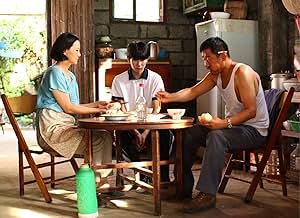Di jiu tian chang
- 2019
- 3 घं 5 मि
IMDb रेटिंग
7.7/10
5.9 हज़ार
आपकी रेटिंग
अपनी भाषा में प्लॉट जोड़ेंTwo married couples adjust to the vast social and economic changes taking place in China from the 1980s to the present.Two married couples adjust to the vast social and economic changes taking place in China from the 1980s to the present.Two married couples adjust to the vast social and economic changes taking place in China from the 1980s to the present.
- पुरस्कार
- 43 जीत और कुल 60 नामांकन
Yanguozhang Zhao
- Xinjian Zhang
- (as Yangouzhang Zhao)
फ़ीचर्ड समीक्षाएं
This years we are witnissing something of a "Chinese new wave". "So long my son" was already the third Chinese film I saw this year (after "An elephant sitting still" (2018, Bo Hu) and "Long day's journey into night" (2018, Gan Bi)).
"So long my son" is the perfect sequel to "Lifetimes" (1994, Zhang Yimou). "Lifetimes" covers de period 1940 - 1970 in Chinese history and "So long my son" the period 1980 up till now. In "Lifetimes" the culrurel revolution is the most defining event, in "So long my son" it is the one child policy.
In "Lifetimes" the story is told in chronological order. "So long my son" jumps back and forth in time. Together with the many characters "So long my son" asks from his viewers that they keep paying attention. The one who does so is richly rewarded for this. Moreover the peculiar chronological order is in my opinion less artificial than in for example "Memento" (2000, Christoher Nolan). Some events in the film have such an emotional "gravity" that it is just natural that they disrupt the normal chronological order.
"So long my son" is in some ways critical to Chinese society. Apart from the one child policy and the damage it has done it shows the growing gap between rich and poor. The critisism mainly concerns however policies started by Deng Xiaoping. The widening of the distance between rich and poor is after all an indirect consequence of the open door policy (mixed state ruled and market economy) that was introduced in 1978.
"So long my son" says nothing about the surveillance state that Xi Jinping is building at the moment. Long it was thought that a more market oriented economy would lead by itself to a more liberal political system. This did not happen, and one can call that "The Chinese paradox". Now we have a smaller "Chinese paradox" in the movie industry, where the surveillance state does not preclude the already mentioned Chinese new wave.
"So long my son" is the perfect sequel to "Lifetimes" (1994, Zhang Yimou). "Lifetimes" covers de period 1940 - 1970 in Chinese history and "So long my son" the period 1980 up till now. In "Lifetimes" the culrurel revolution is the most defining event, in "So long my son" it is the one child policy.
In "Lifetimes" the story is told in chronological order. "So long my son" jumps back and forth in time. Together with the many characters "So long my son" asks from his viewers that they keep paying attention. The one who does so is richly rewarded for this. Moreover the peculiar chronological order is in my opinion less artificial than in for example "Memento" (2000, Christoher Nolan). Some events in the film have such an emotional "gravity" that it is just natural that they disrupt the normal chronological order.
"So long my son" is in some ways critical to Chinese society. Apart from the one child policy and the damage it has done it shows the growing gap between rich and poor. The critisism mainly concerns however policies started by Deng Xiaoping. The widening of the distance between rich and poor is after all an indirect consequence of the open door policy (mixed state ruled and market economy) that was introduced in 1978.
"So long my son" says nothing about the surveillance state that Xi Jinping is building at the moment. Long it was thought that a more market oriented economy would lead by itself to a more liberal political system. This did not happen, and one can call that "The Chinese paradox". Now we have a smaller "Chinese paradox" in the movie industry, where the surveillance state does not preclude the already mentioned Chinese new wave.
'So Long, My Son' made in 2019 by Xiaoshuai Wang and presented at the Berlin International Film Festival in February 2020 is proof that Chinese cinema is much more diverse and interesting than the mix of historical, martial arts or political propaganda movies that film lovers outside of China know superficially. It is a complex and ambitious film in itself, with a duration of 3 hours of projection, which is the first series of what is planned to become a trilogy that deals with the history of China and the impact of the great transformations that this huge country and its people has gone through in the last 40 years. On many respects the film is sincere and courageous in addressing historical processes and economic and social changes that have been paid for with a huge human price: the policies aimed at restricting families to at most one child per couple, and the transition from planned economy to capitalism market, with dramatic consequences in the lives of millions of Chinese workers who lost their dull but safe employment due to the closure or downsizing of state-owned enterprises, people forced to re-profile and migrate to ensure their livelihoods. The film's size and the ambitions of director Xiaoshuai Wang did not stop him from making a deeply human movie based on a well-written story anchored in China's recent history, with characters that viewers in China and anywhere else in the world can identify with.
We are following the saga of two families from northern China during over three decades, from the ideological relaxation and economic liberalization of the 1980s to the capitalist abundance and socio-economic inequalities of the present. The Liu and Chen families live in the same crowded house, they all work in the same factory, they are neighbors and friends, the two boys of the families were born on the same day and grew up as brothers. The two families symbolically represent different destinies in these times of change. The Liu family remains at the level of simple workers and then small entrepreneurs, they hardly survive the economic shocks that will cause them to migrate to the south of developing China but also a personal tragedy when their only child drowns. The Shen family is more adaptable, earlier the woman reaches a political leadership position, later they succeed economically and make a fortune. Although families break up to reunite only in the end, their destinies remain tied to a secret that cannot be forgotten or erased, perhaps only eventually forgiven.
The two actors who played the roles of the Liu couple impress with the depth, realism and sensitivity of performances. They also convinced the Berlin Festival jury, which awarded them both acting prizes, and I can understand the reasons. The tragedy of losing a child has been represented on screens before, but so far we have not seen such a deep interpretation of the consequences of the demographic policy of the only child at the level of the family cell. Those who see will hardly forget. Director Xiaoshuai Wang alternates the broad takes that describe the complex landscapes of a country in transformation and industrialization, with the intimate ones in the inhabited (but not private) spaces that become familiar to us in all details. Realism alternates with aesthetics and the results are remarkable. The props are chosen carefully, every detail counts. The makeup is perfect. If we pat attention we realize how the director visually expresses messages that he could not make explicit in words. For example, some of the factory-filmed scenes depicting the 1980s include an implicit critique of dullness of life, clothing uniformity and ideological regimentation. The narrative of the film is divided into two parts with different structures, which could belong to different movies. In the first two hours we reconstruct the story of the two families, the conflicts and their evolution in sequences of flashbacks that gradually compose the image and develop the characters. The last hour of the film describes the reunion that takes place in or near contemporaneity, and proposes a reconciliation and a resolution of conflicts. Personally, I liked the first part more, the solution in the end has something too idyllic and too forced which made it look not completely credible. I was left with the impression that Xiaoshuai Wang is a director of great strength and depth who when allowed to develop his artistic and historical vision can lead a movie to admirable results.
We are following the saga of two families from northern China during over three decades, from the ideological relaxation and economic liberalization of the 1980s to the capitalist abundance and socio-economic inequalities of the present. The Liu and Chen families live in the same crowded house, they all work in the same factory, they are neighbors and friends, the two boys of the families were born on the same day and grew up as brothers. The two families symbolically represent different destinies in these times of change. The Liu family remains at the level of simple workers and then small entrepreneurs, they hardly survive the economic shocks that will cause them to migrate to the south of developing China but also a personal tragedy when their only child drowns. The Shen family is more adaptable, earlier the woman reaches a political leadership position, later they succeed economically and make a fortune. Although families break up to reunite only in the end, their destinies remain tied to a secret that cannot be forgotten or erased, perhaps only eventually forgiven.
The two actors who played the roles of the Liu couple impress with the depth, realism and sensitivity of performances. They also convinced the Berlin Festival jury, which awarded them both acting prizes, and I can understand the reasons. The tragedy of losing a child has been represented on screens before, but so far we have not seen such a deep interpretation of the consequences of the demographic policy of the only child at the level of the family cell. Those who see will hardly forget. Director Xiaoshuai Wang alternates the broad takes that describe the complex landscapes of a country in transformation and industrialization, with the intimate ones in the inhabited (but not private) spaces that become familiar to us in all details. Realism alternates with aesthetics and the results are remarkable. The props are chosen carefully, every detail counts. The makeup is perfect. If we pat attention we realize how the director visually expresses messages that he could not make explicit in words. For example, some of the factory-filmed scenes depicting the 1980s include an implicit critique of dullness of life, clothing uniformity and ideological regimentation. The narrative of the film is divided into two parts with different structures, which could belong to different movies. In the first two hours we reconstruct the story of the two families, the conflicts and their evolution in sequences of flashbacks that gradually compose the image and develop the characters. The last hour of the film describes the reunion that takes place in or near contemporaneity, and proposes a reconciliation and a resolution of conflicts. Personally, I liked the first part more, the solution in the end has something too idyllic and too forced which made it look not completely credible. I was left with the impression that Xiaoshuai Wang is a director of great strength and depth who when allowed to develop his artistic and historical vision can lead a movie to admirable results.
Set against a background of political and social change in China, it follows the life of the married "Yaojun" (Jingchun Wang) and "Liyun" (Mei Yong). They are contented enough until a tragedy disheartens them thoroughly and they move to a more urban existence which doesn't really suit anyone. It's especially problematic for their adopted son "Liu" (Roy Wang) who takes recalcitrance to an whole new level and just walks out on them one day. Initially concerned for his wellbeing, time elapses and they have to face the immediate difficulties of their own lives - at work and emotionally, before concluding that perhaps they ought to return home. It's a story that constantly moves the stability goalposts for the couple - and though their own love remains steadfast, the pressures put upon them by a society that restricts family numbers then evolves slowly into a market economy that endangers their very livelihood and what prosperity they have worked hard for poses increasing challenges. Eventually, they (and us) begin to realise that perhaps it's grief that is lacking from their life. Grief for their earlier loss(es), for allowing that to fester and inhibit much of the joy of later life - and maybe a resentment of the hand they were dealt by fate. The closing scenes are poignantly reconciliatory and though it looks long on the tin, the slowly developing characterisations are really well presented by two actors who deliver a gently effective chemistry that is palpable - is sometimes exasperating, throughout.
An immense emotional masterpiece with intellectual vibrations which invites the audience, through the crossed gaze of several Chinese families, to question the universality of the feeling of filiation and the meaning of existence. A magisterial and bitter melodrama. 7/8 of 10.
From China, a masterpiece."So Long, My Son" is an epic account of two families dealing with the trials and tribulations of life in China from the 1980's to the present and is the kind of confident, heartfelt drama many Western filmmakers can only dream about. This is a family saga worthy of Ozu but perhaps even more grounded and down-to-earth, superbly acted by everyone, (leads Jingchun Wang and Mei Yong won Best Actor and Actress at Berlin and deservedly so), superbly shot on a large canvas by Hyun Seok Kim and brilliantly direced by Xiaoshuai Wang. It may not be the easiest film to follow; Wang doesn't tell his tale in a linear fashion as we move back and forth in time as memories are triggered but then who said cinema has to be easy to follow.
Of course, this isn't just a family drama but a comment on Chinese society and is consequently an intimate epic and a beautifully realised political saga at the same time. The 'One Family, One Child' policy is at its core and it is this need for family and for human contact in general that dictates the film's structure. Wang alternates between long shots and close-ups to emphasise the distance between the characters just as the use of colour and music, and naturally make-up, delineate the passage of time. The film begins with a death and death is never far from its surface and yet it's never sentimental but at times almost unbearably moviing. Like I say, a masterpiece and one of the finest films of recent years.
Of course, this isn't just a family drama but a comment on Chinese society and is consequently an intimate epic and a beautifully realised political saga at the same time. The 'One Family, One Child' policy is at its core and it is this need for family and for human contact in general that dictates the film's structure. Wang alternates between long shots and close-ups to emphasise the distance between the characters just as the use of colour and music, and naturally make-up, delineate the passage of time. The film begins with a death and death is never far from its surface and yet it's never sentimental but at times almost unbearably moviing. Like I say, a masterpiece and one of the finest films of recent years.
क्या आपको पता है
- ट्रिवियाThe film explores the consequences across three decades of China's onetime one-child policy which lasted from 1979-2013.
- गूफ़When Hao Shen's mother died, he wore a black cloth on his left arm. However, in most areas of China, especially in northern China, it is a folk custom for children to wear a black cloth on their right arm after the death of mother.
- कनेक्शनReferenced in Estrenos Críticos: Septiembre 2019 (2019)
- साउंडट्रैकAuld Lang Syne
Traditional tune, lyrics by Robert Burns
टॉप पसंद
रेटिंग देने के लिए साइन-इन करें और वैयक्तिकृत सुझावों के लिए वॉचलिस्ट करें
- How long is So Long, My Son?Alexa द्वारा संचालित
विवरण
- रिलीज़ की तारीख़
- कंट्री ऑफ़ ओरिजिन
- आधिकारिक साइटें
- भाषाएं
- इस रूप में भी जाना जाता है
- So Long, My Son
- फ़िल्माने की जगहें
- उत्पादन कंपनियां
- IMDbPro पर और कंपनी क्रेडिट देखें
बॉक्स ऑफ़िस
- दुनिया भर में सकल
- $80,96,596
- चलने की अवधि
- 3 घं 5 मि(185 min)
- रंग
- पक्ष अनुपात
- 1.78 : 1
इस पेज में योगदान दें
किसी बदलाव का सुझाव दें या अनुपलब्ध कॉन्टेंट जोड़ें

![Trailer [OVS] देखें](https://m.media-amazon.com/images/M/MV5BZThlNmFjNjAtNjkwZS00NTU1LWJkM2ItZGIyNmVlZDRmMGM5XkEyXkFqcGdeQXRyYW5zY29kZS13b3JrZmxvdw@@._V1_QL75_UX500_CR0)
